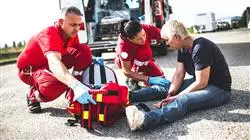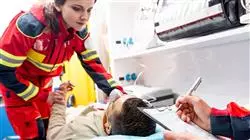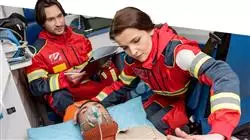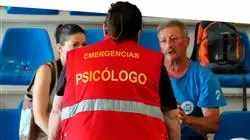University certificate
The world's largest faculty of medicine”
Introduction to the Program
A Postgraduate certificate with which you will be able to implement in your practice the most effective and innovative strategies for the management of victims of crisis situations according to the recommendations of psychology"

The innumerable factors that influence the state of a person when a crisis or emergency situation occurs depend, to a large extent, on its nature and the characteristics of the context in which the traumatic event takes place. From a psychological point of view, it is not the same to intervene with an adult victim as with a child, just as the behavior of a person under the influence of alcohol and/or drugs is different from that of another who is facing a traumatic situation without having consumed any substance.
In this type of case, the patient's collaboration is fundamental, not only to favor the achievement of stability, but also to allow the security forces to carry out their work quickly and effectively, as well as to avoid the appearance of sequelae in the patient's mental health in the long term. This can only be achieved through effective management by healthcare professionals, who can make use of the action protocols developed by psychology for these types of events.
In order for medical specialists to be up to date on the latest developments in this field, TECH and its team of experts have developed a Postgraduate certificate focused on this. Through 300 hours of the best theoretical and audiovisual content, graduates will be able to delve into the most effective techniques for the control of emotions in more than 15 different profiles: aggressive patients, out-of-hospital suicidal patients, family members of missing persons, victims of gender violence or sexual aggression, etc.
It is, therefore, a unique opportunity to perfect your professional skills in just 12 weeks through a comprehensive, dynamic and intensive educational experience. In addition, its convenient and flexible 100% online format will allow you to work on it from wherever you want and with a schedule fully adapted to your availability, guaranteeing the updating of your knowledge in a way that balances with the activity of your practice.
Would you like to update your knowledge in the management of out-of-hospital suicidal patients? Enroll in this Postgraduate certificate and implement the latest developments in psychology in your strategies"
This Postgraduate certificate in Action Protocols in Advanced Specific Situations contains the most complete and up-to-date scientific program on the market. The most important features include:
- The development of practical cases presented by experts in Emergency Psychology
- The graphic, schematic, and practical contents with which they are created, provide scientific and practical information on the disciplines that are essential for professional practice
- Practical exercises where self-assessment can be used to improve learning
- Its special emphasis on innovative methodologies
- Theoretical lessons, questions to the expert, debate forums on controversial topics, and individual reflection assignments
- Content that is accessible from any fixed or portable device with an Internet connection
Healthcare workers are constantly confronted with the delivery of bad news. With this Postgraduate certificate you will work on the most effective techniques to communicate efficiently in these situations"
The program’s teaching staff includes professionals from the sector who contribute their work experience to this educational program, as well as renowned specialists from leading societies and prestigious universities.
Its multimedia content, developed with the latest educational technology, will allow professionals to learn in a contextual and situated learning environment, i.e., a simulated environment that will provide immersive education programmed to prepare in real situations.
The design of this program focuses on Problem-Based Learning, by means of which professionals must try to solve the different professional practice situations that are presented to them throughout the academic year. For this purpose, students will be assisted by an innovative interactive video system developed by renowned experts.
A perfect program to perfect your skills related to emotional support when coping with loss, in a 100% online way"

If you are looking for a program to update you on the protocols for dealing with the aggressive patient, this Postgraduate certificate will become your guide"
Syllabus
This program has been designed taking into account the latest scientific evidence discovered in relation to the psychological management of victims of specific emergency situations. Based on this, a multidisciplinary qualification has been constituted in which, in addition to including the best theoretical syllabus, hours of additional material have been selected: from research articles and complementary readings, to detailed videos and real clinical cases based on contexts such as crises with children or accidents with victims with different profiles. In this way, the graduate will be able to update their medical knowledge in the psychological area in a guaranteed way and through a convenient 100% online format.

In the Virtual Campus you will find hours of additional high-quality content, so you can contextualize the information and delve in a personalized way in the different sections of the syllabus"
Module 1. Action Protocols for Specific Situations I
1.1. Intervention in Acute Stress, Anxiety and Panic
1.1.1. Introduction to the Concept of Acute Stress, Anxiety and Panic
1.1.2. Acute stress Intervention Process
1.1.3. Anxiety Intervention Process
1.1.4. Panic Intervention Process
1.2. Grief
1.2.1. Concept of Grief
1.2.2. Theories on Grief
1.2.3. Manifestations of Normal Grief
1.3. Introduction and Types of Grief
1.3.1. Stages of Grief
1.3.2. Types of Grief
1.3.3. Functions of Grief
1.4. Grief Crisis Intervention
1.4.1. Importance of Intervention in Grief
1.4.2. Grief Crisis Intervention Process
1.5. Delivering Bad News I
1.5.1. Announcing Bad News
1.5.2. Procedure for Communicating Bad News
1.5.3. Stages of a Person Receiving Bad News
1.6. Delivering Bad News II
1.6.1. Professional Skills in the Delivery of Bad News
1.6.2. Factors that Affect the Delivery of Bad News
1.6.3. Specific Considerations for Communicating Bad News to Children and Other Groups
1.7. Emotional Support in the Event of Loss
1.7.1. Emotional Support
1.7.2. Loss
1.7.3. Emotional Support as a Influencing Factor in Crisis Situations
1.8. Intervention with Aggressive Patients
1.8.1. Aggressive Patient Characteristics
1.8.2. Keys Points for Intervention for Patients with Aggressive Behavior
1.8.3. Therapist Skills for Dominating the Therapeutic Scenario for Patients with Aggressive Behavior
1.8.4. Intervention Techniques with Aggressive Patients
1.9. Intervention and Management of the Suicidal Outpatient
1.9.1. Suicide
1.9.2. Therapeutic skills for the Management of the Suicidal Outpatient
1.9.3. Intervention with Patients at Risk of Suicide
1.10. Intervention with Family Members of Missing Persons
1.10.1. Factors to Take into Account in the Management of Missing Persons Family Members
1.10.2. Techniques for Coping with Traumatic Events
1.10.3. Intervention Process
Module 2. Action Protocols for Specific Situations II
2.1. Intervention with Victims of Gender Violence
2.1.1. Introduction to Domestic Violence
2.1.2. Principles of Intervention with Patients Victims of Gender Violence
2.1.3. Skills and Knowledge for Targeted Intervention
2.1.4. Intervention Procedure
2.2. Intervention with Victims of Sexual Assault
2.2.1. Introduction to the Concept of Sexual Assault
2.2.2. Trauma in the Victims of Sexual Assault
2.2.3. Skills and Knowledge for Targeted Intervention
2.2.4. Procedures for Intervention with Victims of Sexual Assault
2.3. Intervention with People Intoxicated by Alcohol and Drugs
2.3.1. Drug Use
2.3.2. Drug Classification
2.3.3. Intervention with Consumers
2.4. Crisis Intervention with Children
2.4.1. The Therapeutic Process with Children
2.4.2. Key Considerations and Principles in Therapeutic Intervention with Infants
2.4.3. Effective Tools for Intervention with Children
2.5. Crisis Intervention with the Psychiatric Patient
2.5.1. Introduction to the Concept of the Psychiatric Patient
2.5.2. The Role of the Psychologist in Crisis Intervention with a Psychiatric Patient
2.5.3. Keys Considerations and Principles of Effective Intervention
2.6. Crisis Intervention with the Elderly
2.6.1. Elderly People in the Psychologist's Office
2.6.2. Key Considerations and Principles for Crisis Intervention with Infants
2.7. Crisis Intervention with People with Intellectual Disabilities
2.7.1. Introduction to Intellectual Disability
2.7.2. Key Considerations and Principles for Crisis Intervention with Patients with ID
2.7.3. Tools for Interventions with People with ID
2.8. Crisis Intervention with Immigrants
2.8.1. Trauma and Stress for Immigrants
2.8.2. Key Considerations and Principles for Crisis Intervention with Immigrants
2.9. Accompaniment in the Identification of Corpses
2.9.1. Therapeutic Support
2.9.2. Accompaniment in the Identification of Corpses
2.9.3. Funeral and Burial Ceremony
2.10. Psychological Support for Technicians
2.10.1. Upon Completion of the Intervention
2.10.2. Preventing Fatigue
2.10.3. Shifts and Breaks
2.10.4. Coping Strategies

Postgraduate Certificate in Action Protocols in Advanced Specific Situations
At TECH Global University we have designed this course with the objective of providing solid training on the standardized and systematic procedures that medical professionals follow in critical and emergency situations. These protocols are designed to improve patient care and ensure patient and medical staff safety. Medical professionals must be well trained and aware of the appropriate protocols for critical and emergency situations. For each surgical procedure, there is a specific protocol that includes the patient preparation process, sterilization of surgical equipment, and pre-, intra- and postoperative care. Advanced cardiopulmonary resuscitation (CPR): this protocol is used when a person is in cardiac or respiratory arrest. Advanced CPR includes the application of defibrillators, airway management, respiratory therapy and medication. Surgical procedures: for each surgical procedure, there is a specific action protocol that includes the patient preparation process, sterilization of surgical equipment, and pre-, intra- and postoperative care. Medication protocols: these are used in situations where intravenous medication is administered or where the patient has suffered an overdose. These protocols include patient assessment, monitoring of vital signs, calculation of correct dosages, and safe and effective administration of medication. Infectious disease protocols: include management of the patient with infectious diseases, infection prevention and control measures, proper use of personal protective equipment, and biological waste management. Trauma protocols: these are used in emergency situations in cases of serious injury. These protocols include the use of personal protective equipment, management of the patient's airway, management of bleeding and safe transport of the patient to the hospital.







